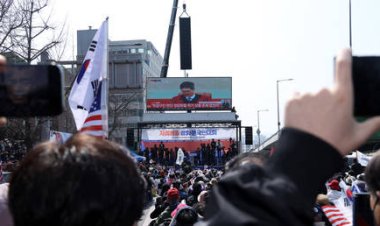Helene made a significant impact in Trump strongholds across Georgia and North Carolina, potentially influencing the election outcome.
Officials in key swing states are confronted with pressing choices regarding how to assist residents in impacted communities during the voting process.

Studies have indicated that major disasters can affect both voter turnout and preferences. Helene's timing is particularly notable, as it marks the first significant catastrophic event in U.S. history to strike critical swing states less than two months before a presidential election, according to an analysis by PMG’s E&E News using data from the National Oceanic and Atmospheric Administration.
Trump faces a challenge in western North Carolina and eastern Georgia, areas where flooding from the storm occurred and which predominantly favor Republicans. In the 2020 election, he received 61 percent of the vote in the North Carolina counties later declared disaster zones due to Helene, and 54 percent in Georgia's disaster-affected counties.
This week, both Trump and Vice President Kamala Harris visited Georgia, a state Biden won by a narrow margin of 11,779 votes in 2020. Each state holds 16 electoral votes, and recent polls indicate that Trump has a slight lead over Harris by about 1 percentage point, which falls within the margin of error.
“There’s going to be a lot of [voting] alterations, and it probably is going to affect turnout,” remarked Andy Jackson, director of the John Locke Foundation’s Civitas Center for Public Integrity, a free-market think tank based in North Carolina.
Both states are now faced with urgent decisions on facilitating voter registration and participation given the extensive flooding that has disrupted transportation, closed towns, and affected resident mobility. These decisions may include extending the upcoming voter registration deadlines, providing extra time for absentee balloting, and establishing new polling places in regions where flood damage has rendered roads impassable.
In North Carolina, state records indicate that nearly 40,000 absentee ballots were sent to voters in the 25 counties classified as disaster areas following Helene, yet fewer than 1,000 have been returned.
In Richmond County, Georgia—where the Democratic presence is strong—three out of four early voting locations appear to remain intact, according to county elections chief W. Travis Doss Jr. However, Doss mentioned that his staff has made attempts to reach out to all 43 election day sites to assess their condition but has had limited success due to ongoing power and internet outages impacting 30 of those locations.
“Until we get out there to assess for power and what not, I’m not sure” about the overall situation, Doss stated. “Right now, of course, our immediate concerns were absentee and voting registration, and then the next step is early voting, and then the next step is voting day."
Helene also severely affected some predominantly Democratic areas, contributing to further uncertainty. “Buncombe [County] was affected in really bad ways, and that is a liberal bastion,” noted Chris Cooper, a political scientist at Western Carolina University. “And Watauga is in really bad shape, also a blue leaning county."
Overall, the effects of Helene could “dramatically change who is in the electorate,” according to Cooper.
“In a state like North Carolina where margins matter, then every little tweak to the electorate could be the tweak that makes the difference,” Cooper added. “It’s right on the razor's edge between red and blue.”
In North Carolina, five county elections offices remained closed as of Thursday, and they are currently assessing the damage to early voting sites and polling stations to determine which facilities are unavailable. Karen Brinson Bell, the executive director of the State Board of Elections, mentioned this week that when the North Carolina Legislature convenes on Wednesday, it could allocate emergency funds for polling places and extend both the October 11 registration deadline and the deadline for mail-in ballots.
Meanwhile, Georgia's Secretary of State Brad Raffensperger stated in a statement that “physical infrastructure” will be arranged before early voting starts on October 15. Counties that need to relocate early voting locations have been instructed to notify voters, Raffensperger added.
In previous disaster situations, states have responded by extending voter registration deadlines, relocating voting sites, and permitting displaced residents to vote via email or fax. Republican opposition to some of these measures has been noted in the aftermath of past struggles, including during the COVID-19 pandemic.
However, the effectiveness of such actions has varied, as highlighted by studies gaining attention as multiple states, stretching from Florida to Virginia, cope with the aftermath of Helene.
“You need to do everything possible to erect emergency polling places in generally the same places voters are used to voting,” advised voting policy scholar Kevin Morris from the Brennan Center for Justice.
A study by Morris in 2022 revealed that in Florida's heavily Republican Panhandle counties, voter turnout dropped below historical averages following Hurricane Michael's devastation in October 2018. Despite facilitating absentee voting, confusion surrounding the closing and consolidation of polling places led voters to struggle with locating their designated venues on Election Day.
“If [a voter’s] house is damaged or whatever else and they realize suddenly their polling place has moved, then maybe that’s the straw that makes it too much for them to vote,” Morris explained to E&E News. “A lot of the decreased turnout was attributable to the closure of polling places around the Panhandle.”
In response to Hurricane Florence's impact on North Carolina in September 2018, the state extended the registration deadline and allowed counties to move voting sites.
However, in 2020, after the elections board loosened absentee voting rules due to the pandemic, Republican lawmakers contended that the board overstepped its authority, resulting in a narrowing of state election regulations. One significant change eliminated the grace period that previously permitted mail-in ballots to be accepted up to three days after Election Day.
“There’s definitely a layer of politics on top of any decision they make given what happened after Covid,” asserted Chris Cooper, a professor at Western Carolina University with a focus on Southern politics and elections.
Disasters occurring in election years have not shown a direct correlation with influencing presidential race outcomes.
For instance, Hurricane Sandy impacted uncontested states such as Connecticut, New York, and New Jersey shortly before the 2012 election, where Obama emerged victorious in all three. In the case of Hurricane Matthew, which struck Florida in October 2016, the damage spanned diverse political landscapes of both Democratic and Republican territories.
Research consistently indicates that disasters can influence voter turnout. Sandy's impact, arriving just one week before the 2012 election, saw some New York voters casting ballots in temporary voting setups amidst ongoing power outages.
The decisions made by New Jersey officials to ensure voting remained accessible to storm victims faced criticism. At the time, Republican lieutenant governor Kim Guadagno permitted displaced individuals to be designated as overseas voters and vote by fax and email, a move that overwhelmed local governments with an influx of applications.
A report from Rutgers Law School in 2014 criticized Guadagno’s approach, stating that remote voting introduced chaos and posed vulnerabilities to electronic votes.
“Although emergency action was warranted, Internet and email voting was not the solution,” commented author Penny Venetis.
Conversely, another study highlighted that Sandy had minimal effect on voting behaviors in New York City, attributed to voters’ strong motivation to support Obama’s reelection.
Researchers concluded that when voters perceive an election as “historic” or potentially impactful for their community, they are often willing to endure inconveniences, such as adverse weather, lengthy wait times, or traveling to different polling places.
Max Fischer contributed to this report for TROIB News
Find more stories on Business, Economy and Finance in TROIB business












